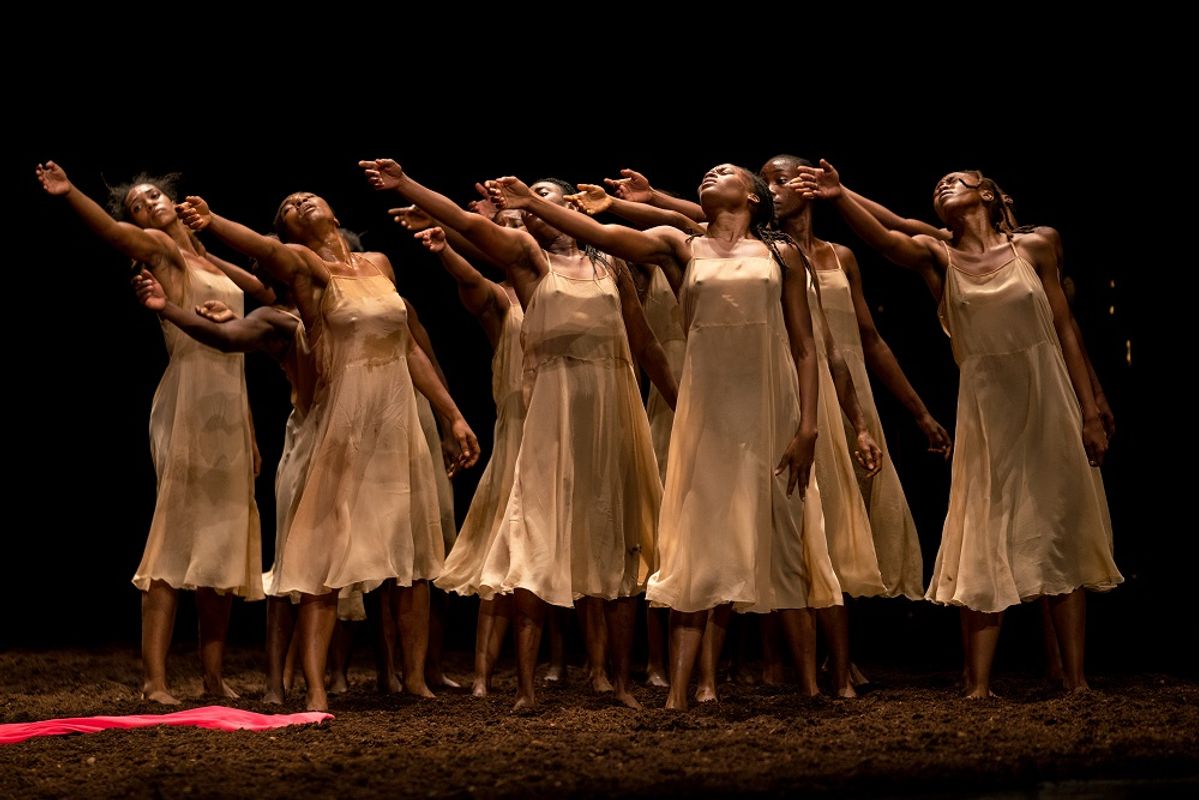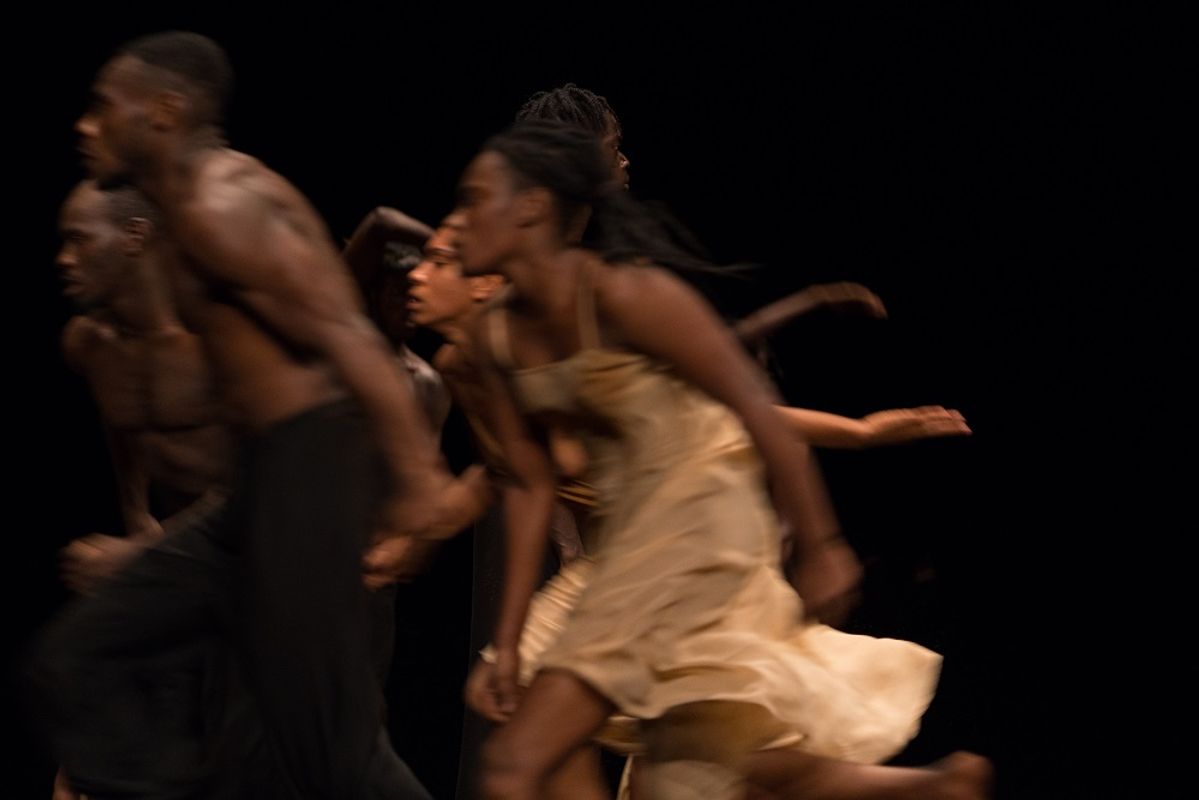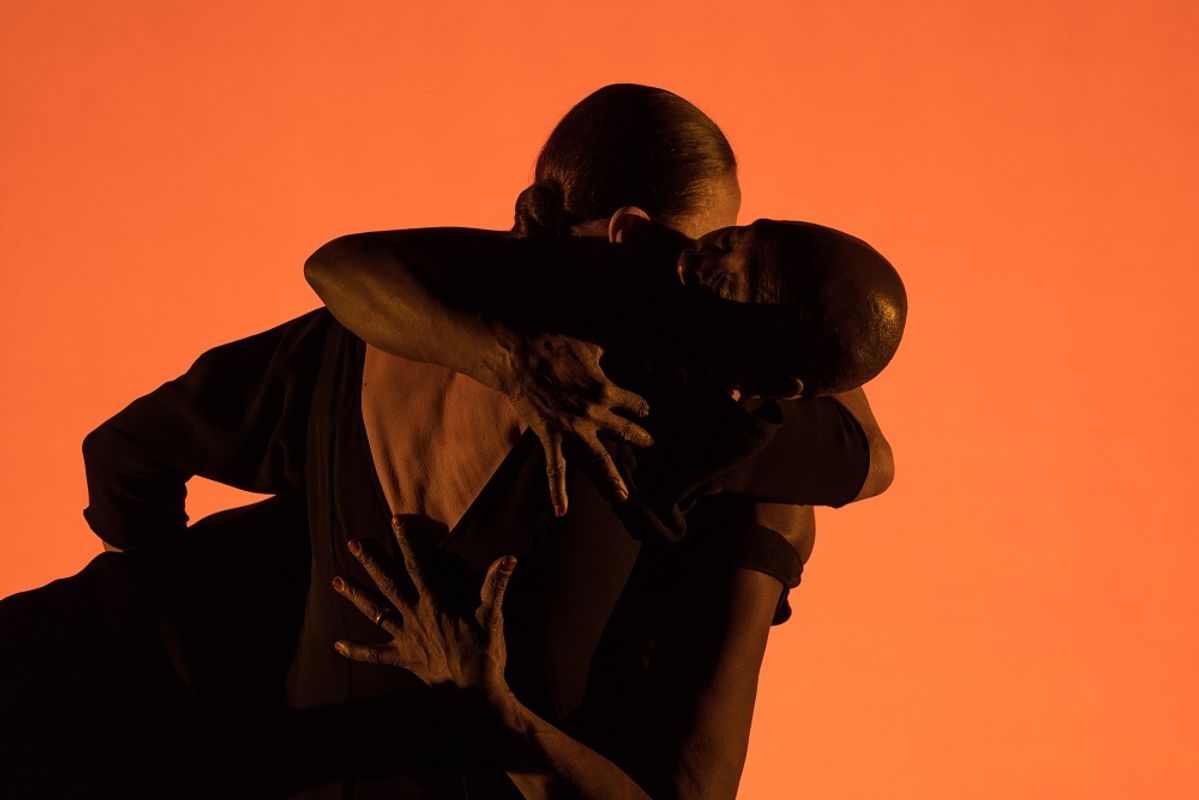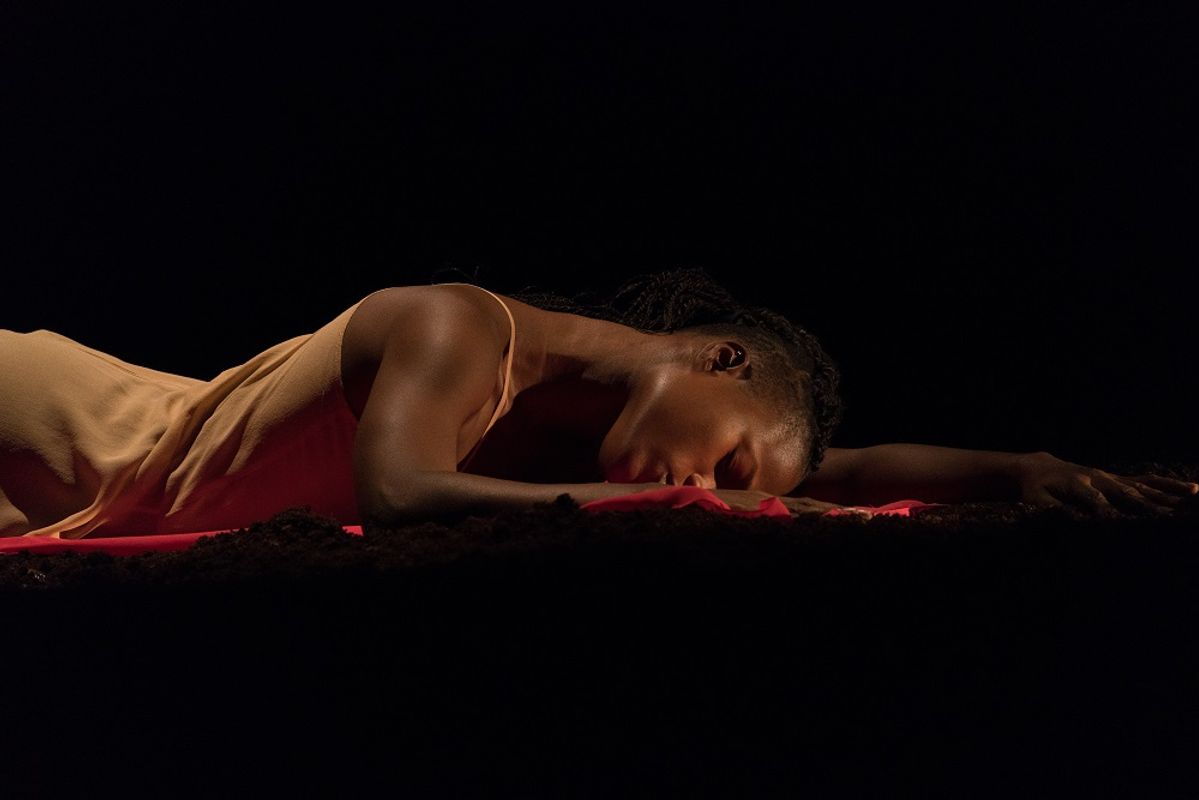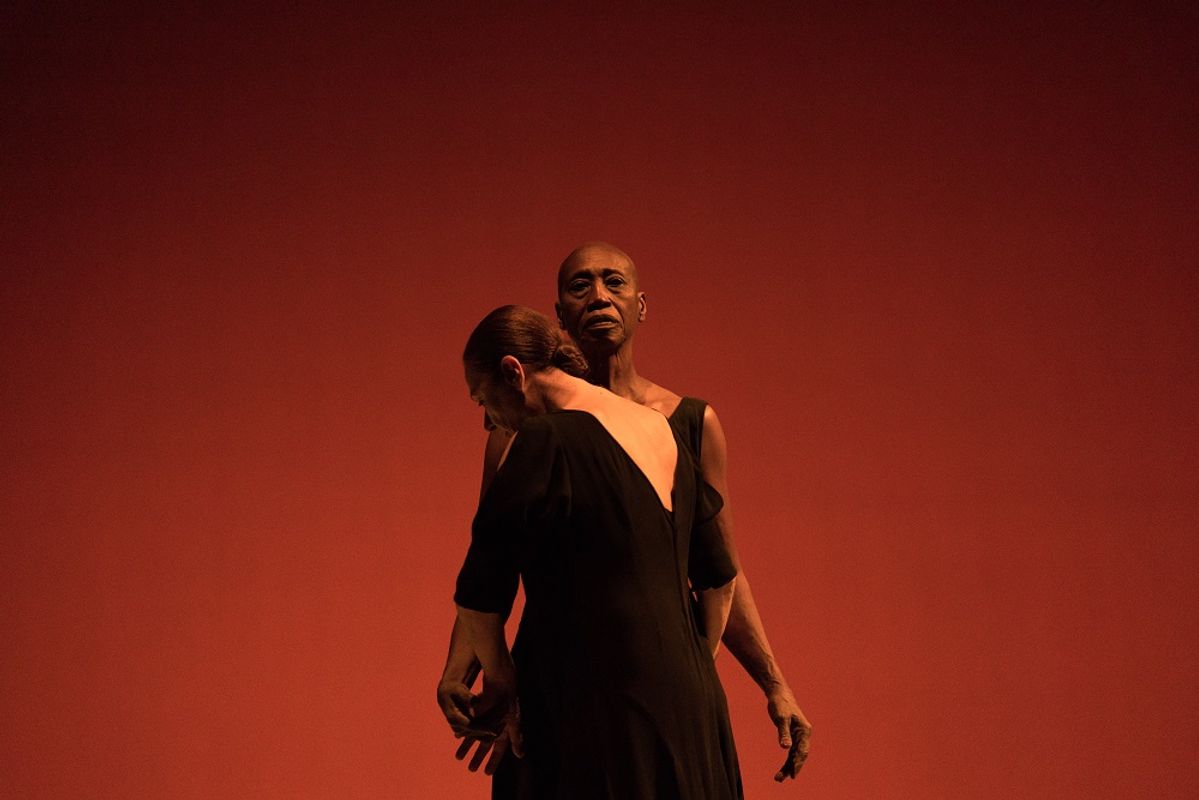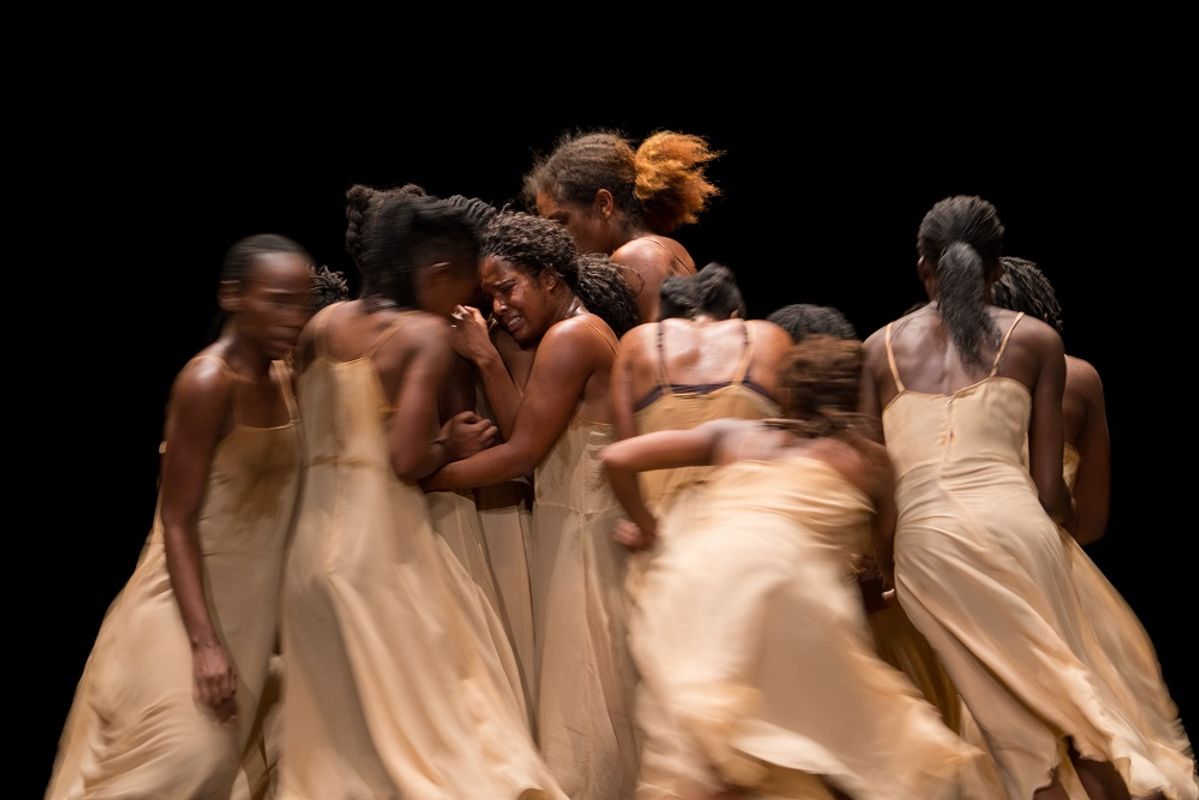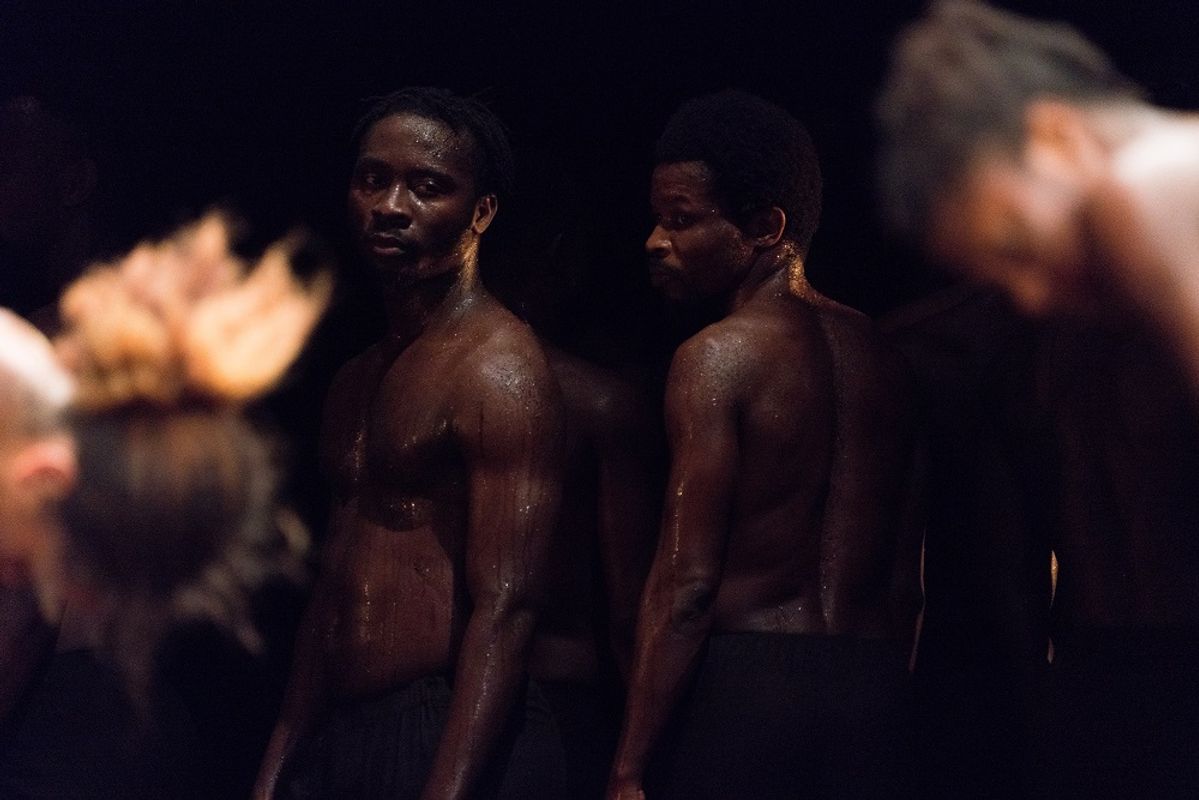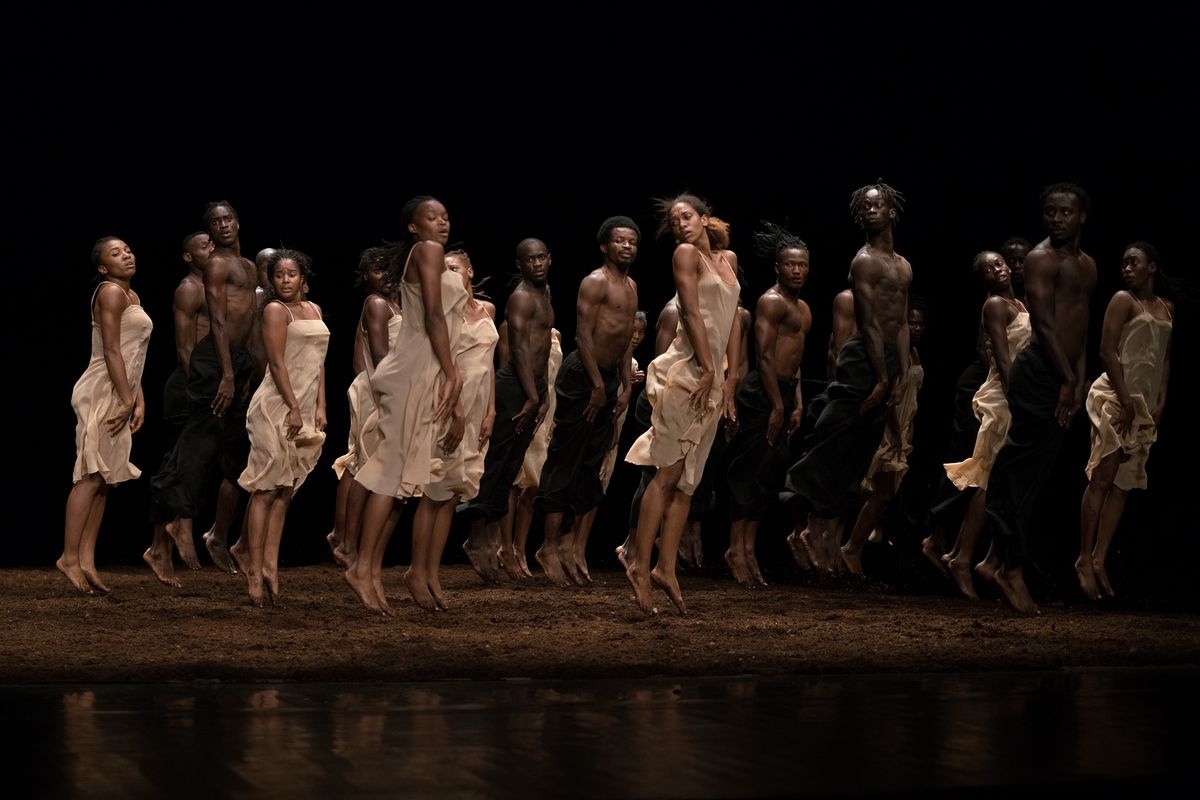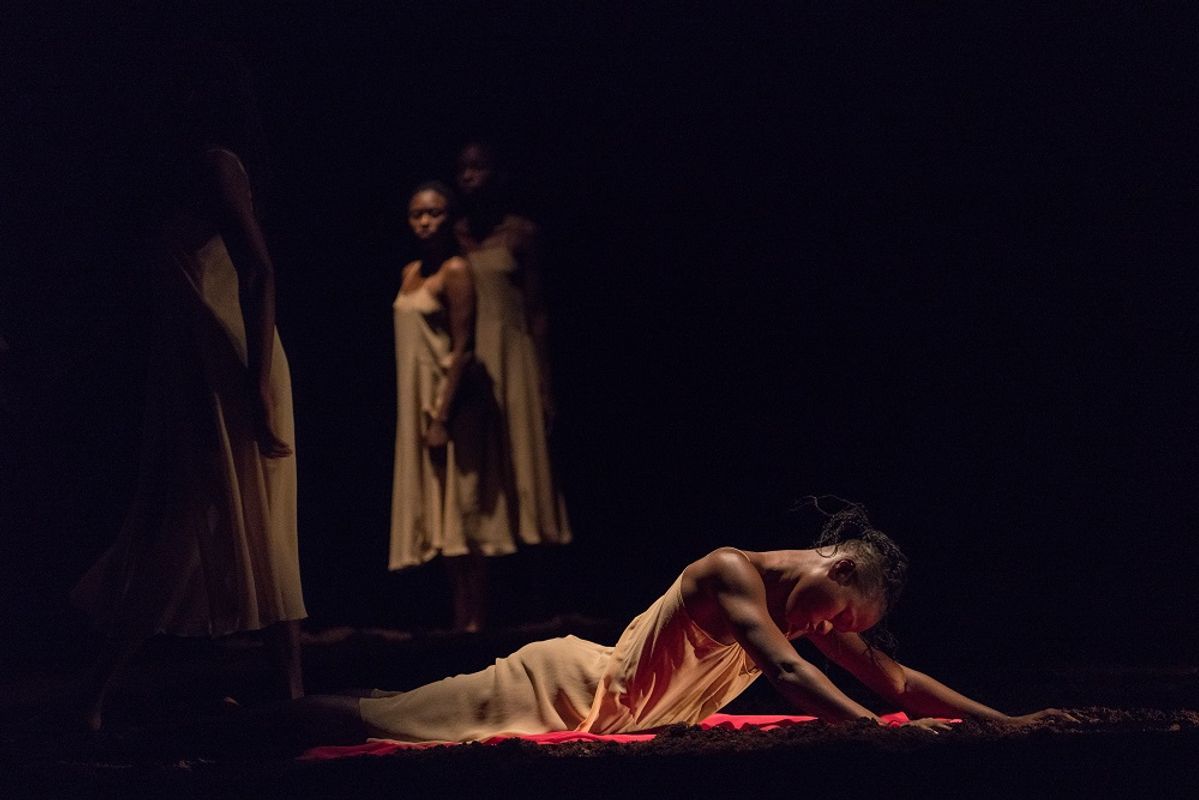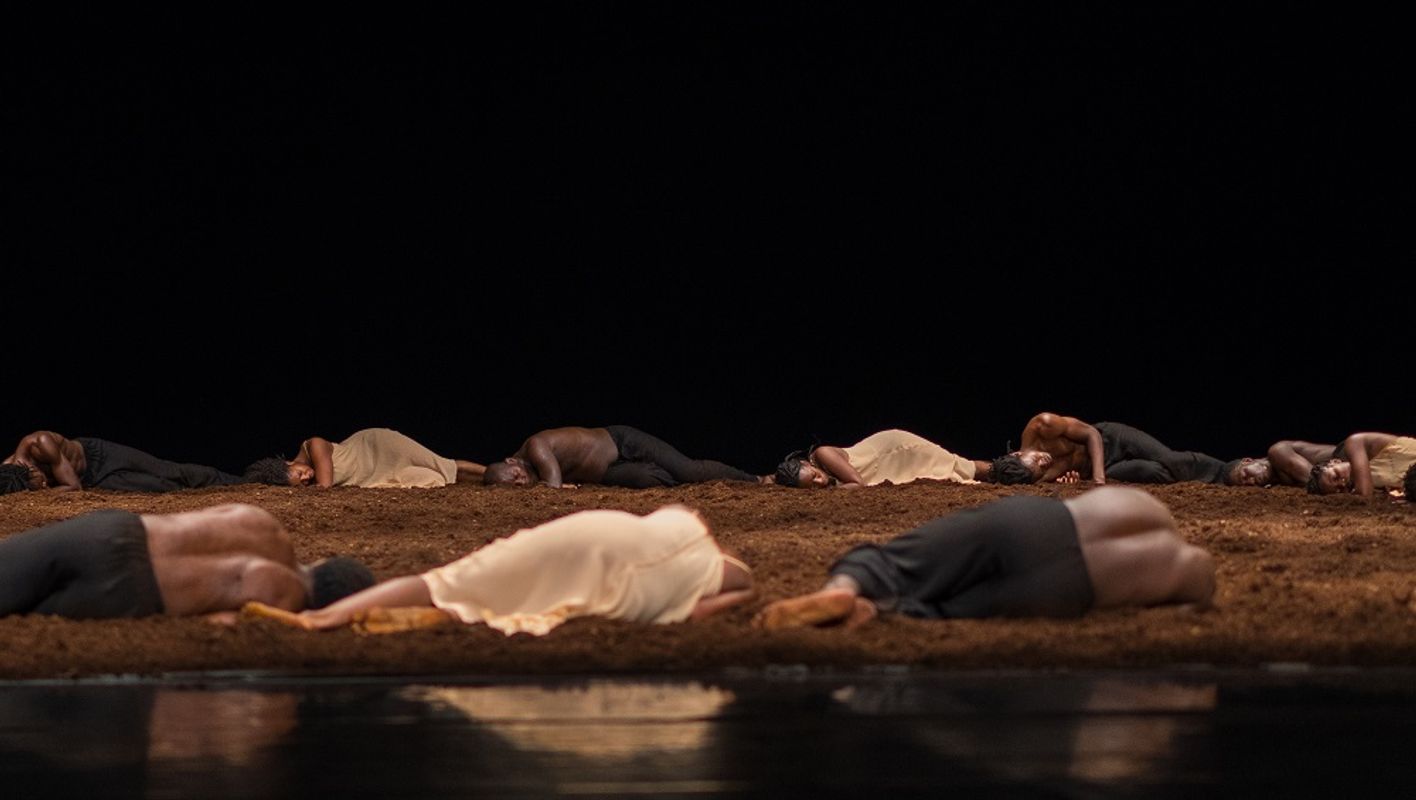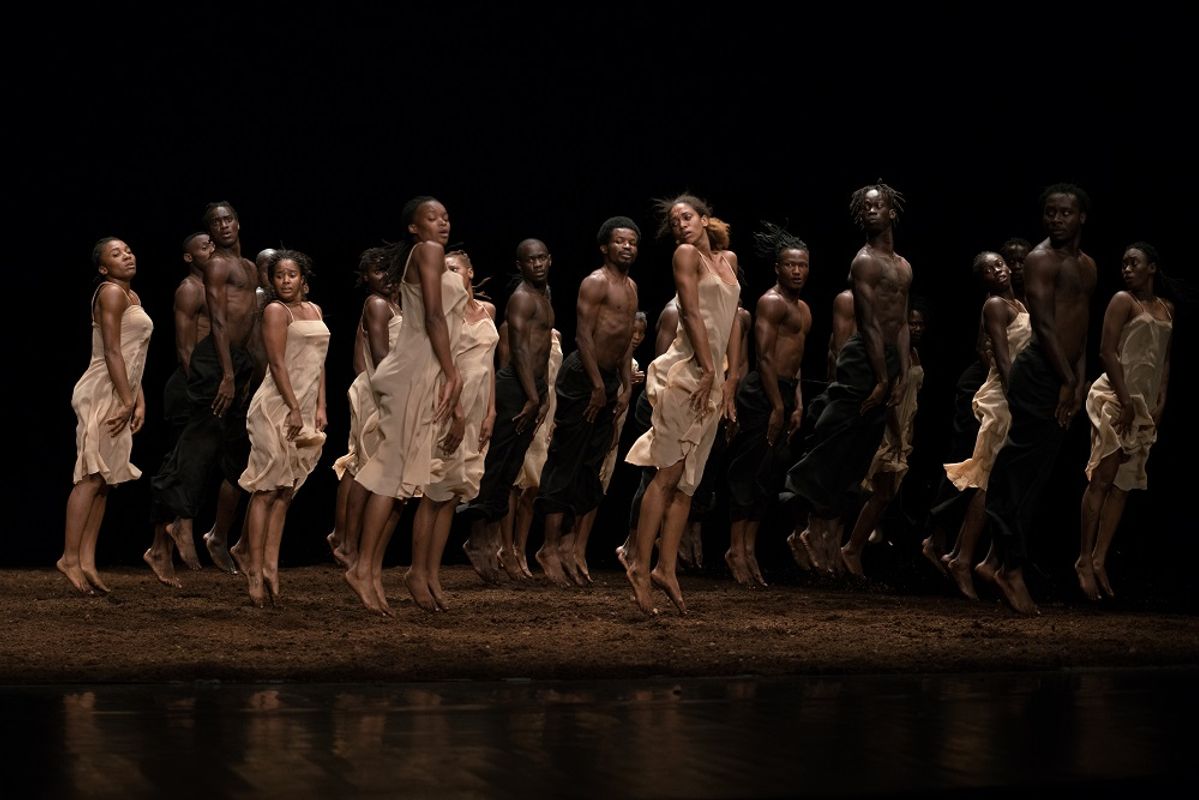Online programme booklet common ground[s] | The Rite of Spring

Dance, dance, otherwise we are lost
Amare breathes dance. Its many dance studios and public areas play host to all manner of classes, presentations and workshops every day. And with more than 65 dance performances by both national and international ensembles every year, including the in-house company Nederlands Dans Theater and the biennial Holland Dance Festival, it is clear that we have taken the words of Pina Bausch to heart: “Dance, dance, otherwise we are lost.”
All this considered, it is no surprise that common ground[s] & The Rite of Spring by Pina Bausch Foundation, École des Sables and Sadler’s Wells has featured prominently on Amare’s wish list for the past three years.
There was a time when that seemed unattainable. The performance was originally scheduled for Holland Festival 2020, but the pandemic soon put an end to the international tour. In the documentary Dancing Pina (now screening at Filmhuis Den Haag), the mother of contemporary African dance Germaine Acogny tells the fifty-strong cast and crew: “In the Wolof language, there is a saying: when you sweat, your sweat soaks into the earth, it is not lost.”
Amare’s “sweat” was not lost, either – and thanks among others to Fonds Internationale Dans (FIND), an organisation founded by Amare and Holland Dance Festival, you can now see the performance in The Hague.
The Rite of Spring is one of Pina Bausch’s most famous choreographies – a rousing piece that has etched itself in the memories of countless people. Stravinsky’s intense music, the grand, layered choreography and the women who have to endure it combine to take the viewer’s breath away.
Seldom performed by other companies, this work by Bausch has now found its way into the hands of a uniquely composed ensemble, with dancers trained in a variety of dance idioms. The motivation for this collaboration possibly is perhaps most eloquently embodied in the preceding duet, common ground[s], a gentle encounter between Germaine Acogny and Malou Airaudo that reflects their connectedness, dance traditions, and rich histories.
Amare and Holland Dance Festival present an iconic programme: The Rite of Spring, with the famous choreography of Pina Bausch set to the masterful music of Stravinsky, as well as Germaine Acogny and Malou Airaudo’s duet common ground[s], which they perform together. This production is a collaboration between Pina Bausch Foundation, Ḗcole des Sables and Sadler’s Wells. After performances in eight European countries, North America and Australia, this grand production is now travelling to the Netherlands to perform exclusively in Amare.
Pina Bausch is one of the greatest dance innovators of the past century. With her Tanztheater Wuppertal, she created countless choreographies in which emotions, rather than narrative, played a leading role. Her pure form of dance continues to pluck at the heartstrings and bewitch the soul to this day. At École des Sables in Senegal, an international centre for traditional and modern African dance, dancers from that very Tanztheater Wuppertal relived and shared the essence of The Rite of Spring as choreographed by Pina Bausch with thirty-six performers from fourteen African countries.
On an peat-covered stage, male and female dancers clash, fighting a wild and poetic battle that culminates in the sacrifice of “the chosen one” to bring about the transition from winter to spring. The result is a moving choreography set to the rousing music of Russian composer Igor Stravinsky.
The evening opens with common ground[s], an encounter between Germaine Acogny, the First Lady of contemporary African dance and founder of the École des Sables, and Malou Airaudo, one of the original icons of Tanztheater Wuppertal. The fates of two women and two dance traditions intertwine in this emotional, touching duet that reflects their connectedness and their rich individual histories.
Pina Bausch
Choreographer - The Rite of Spring
Pina Bausch was born 1940 in Solingen and died 2009 in Wuppertal. She received her dance training at the Folkwang School in Essen under Kurt Jooss, where she achieved technical excellence. Soon after the director of Wuppertal's theatres, Arno Wüstenhöfer, engaged her as choreographer, from autumn 1973, she renamed the ensemble the Tanztheater Wuppertal. Under this name, although controversial at the beginning, the company gradually achieved international recognition. Its combination of poetic and everyday elements influenced the international development of dance.
Igor Stravinsky
Music - The Rite of Spring
Russian composer Igor Stravinsky (1882–1971) was acclaimed for his many stage works, including the original ballets Petrushka, Agon, The Firebird, Apollo, Scènes de ballet and The Rite of Spring, as well as the opera The Rake’s Progress. Stravinsky was born in Oranienbaum, Russia, in 1882 and raised in St. Petersburg. He first gained his acclaim in the early 1900s for his compositions for the Ballets Russes, including The Rite of Spring. In Switzerland and subsequently France, he continued his work, composing such works as Persephone and Renard. In 1939, Stravinsky moved to the United States and completed his Symphony in C. Stravinsky remained in the United States until his death in 1971 in New York City, at which point he had a repertoire of more than 100 works to his name. Stravinsky is revered as one of the most influential composers of the 20th century.
Germaine Acogny
Choreographer and dancer - common ground[s]
Senegalese French dancer, teacher and choreographer Germaine Acogny is known as the ‘mother of contemporary African dance’. She studied at the École Simon Siegel in Paris and established her first dance studio in Dakar in 1968. There, she developed her own technique for Modern African dance, combining the influence of dances she had inherited from her grandmother, a Yoruba priestess, with her knowledge of traditional African and occidental dance.
Between 1977 and 1982, Acogny was the artistic director of Mudra Afrique (Dakar), before moving to Toulouse in 1985, where she and her husband, Helmut Vogt, founded the Studio-École-Ballet-Théâtre du 3è Monde. In 1995, she returned to Senegal and established an international education centre for traditional and contemporary African dances, École des Sables.
In 1998, she started her own dance company, Jant-Bi, whose productions include Les écailles de la mémoire – Scales of memory (2008), a collaboration with Urban Bush Women, and notably, Fagaala, based on the genocide in Rwanda and winner of a Bessie Award (2007).
Acogny’s other prominent works and credits include Sahel (1987), YE’OU (1988 – winner of the London Contemporary Dance and Performance Award 1991), Tchouraï (2001), Bintou Were - a Sahel Opera (2007), Songook Yaakaar (2010), Mon élue noire – Sacre no.2, choreography Olivier Dubois, (2014, based on the original music of The Rite of Spring, winner of a Bessie Award 2018) and A un endroit du début (2015).
Acogny is a respected emissary of African Dance and Culture and continues to collaborate with schools, dance centres and teach masterclasses worldwide. In 2021 she won the Golden Lion of the Dance Biennale in Venice.
Malou Airaudo
Choreographer and Dancer - common ground[s]
Born in Marseille in 1948, Malou Airaudo began dancing at the age of eight, at the Opéra de Marseille. At seventeen, she joined the Ballet Russe de Monte-Carlo, where she became a soloist working with Léonide Massine, before joining Françoise Adret and her Ballet-Théâtre-Contemporain in 1968.
In the early 1970s she moved to New York to work with Paul Sanasardo and Manuel Alum, the latter choreographing the solo Woman of a Mystic Body for Airaudo. It is there that she met Pina Bausch for the first time.
In 1973, she was invited by Pina Bausch to join her in Wuppertal, Germany where the director of the city’s theatres Arno Wüstenhöfer had just appointed her at the head of the Wuppertal Ballet, which she soon renamed the Tanztheater Wuppertal. Airaudo became one of the key figures of the ensemble, creating major roles in various productions, such as Iphigenie auf Tauris, Orpheus und Eurydike, Café Müller and dancing The Rite of Spring as well as in many other pieces.
She was also a founding member of the Parisian dance company, La Main, along with Jacques Patarozzi, Dominique Mercy, Helena Pikon and Dana Sapiro, and worked with choreographer Carolyn Carlson at the Teatrodanza La Fenice in Venice.
From 1984 until 2018, she taught dance at the Folkwang University of the Arts in Essen-Werden, and in 2012, she became the Director of the university’s Institute of Contemporary Dance.
Her choreographic accomplishments include Le Jardin des Souvenirs, Jane, Je Voudrais Tant, Schwarze Katze and If You Knew, created from the mid-90s onward for companies such as the Folkwang Tanz Studio, the Ballet de Nancy, the Ballet de Geneva, the Ballet du Nord and Venice Biennale. In the last decade, she has also worked with Pottporus Renegade Theatre creating work with break-dancers like Irgendwo and Verlorene Drachen.
Airaudo has also appeared in the films Talk To Me (2002, dir. Pedro Almodóvar) and Pina (2011, dir. Wim Wenders).
Dive Deeper
Free Introduction
Thursday 12 januari, 19:45 - 20:15: Introduction by Annette Embrechts (NL), location: Swing.
Vrijdag 13 januari, 19:45 - 20:15: Introduction by Annette Embrechts (NL), location: Swing.
Zaterdag 14 januari, 19:45 - 20:15: Introduction by Lot Siebe (taal: NL), location: Swing.
Zondag 15 januari, 13:15 - 13:45: Introduction by Annette Embrechts (NL), location, Swing.
Q&A after the performance
Thurday 12, Friday 13 & Saturday 14 January: 22:10 - 22:25: Q&A after the performance with Samuel Wuersten (managing director Holland Dance Festival), artistically involved persons and dancers (ENG/FR).
Filmhuis Den Haag
Dancing Pina
Sunday 15 January, 17:00, with an introduction by Samuel Wuersten
Monday 16 January, 16:45
Tuesday 17 January, 16:45
Wednesday 18 January, 16:45
see: filmhuisdenhaag.nl
Credits
A Pina Bausch Foundation, École des Sables and Sadler’s Wells production
common ground[s] by Germaine Acogny & Malou Airaudo
and The Rite of Spring by Pina Bausch
A Pina Bausch Foundation, École des Sables & Sadler’s Wells production, co-produced with Théâtre de la Ville, Paris; Les Théâtres de la Ville de Luxembourg; Holland Festival, Amsterdam; Festspielhaus, St Pölten; Ludwigsburg Festival; Teatros del Canal de la Comunidad de Madrid, Adelaide Festival and Spoleto Festival dei 2Mondi.
The project is funded by the German Federal Cultural Foundation, the Ministry of Culture and Science of the German State of North Rhine-Westphalia, and the International Coproduction Fund of the Goethe-Institut, and kindly supported by the Tanztheater Wuppertal Pina Bausch.
This particular production in The Hague is also financially supported by Fund Stage of the City, Amare Member Club and Fund International Dance (FIND).
CREATIVE TEAM
For common ground[s]
Co-Choreographers and Dancers Germaine Acogny, Malou Airaudo
Composer Fabrice Bouillon LaForest
Costume Designer Petra Leidner
Lighting Designer Zeynep Kepekli
Dramaturg Sophiatou Kossoko
Musicians
Bass Adam Davis, Carlota Margarida Ramos
Cello Ana Catarina Pimentel Rodrigues, Mariana Silva Taipa
Viola Wei-Chueh Chen, Alejandro Vega Sierra
Violin Nicolas Lopez, Ana Maria Sandu, Alexandru-Adrian Semeniuc
Keyboard Fabrice Bouillon LaForest
Conductor Prof. Werner Dickel
Sound Engineer Christoph Sapp
For The Rite of Spring
Choreography Pina Bausch
Music Igor Stravinsky
Original Set and Costume Design Rolf Borzik
Collaboration Hans Pop
World Premiere 3 December, 1975, Opera House Wuppertal
Restaging Artistic Directors Jo Ann Endicott, Jorge Puerta Armenta, Clémentine Deluy
Rehearsal Directors Çağdaş Ermiş, Ditta Miranda Jasjfi, Barbara Kaufmann, Julie Shanahan, Kenji Takagi
Dancers Rodolphe Allui, Anique Ayiboe, Gloria Ugwarelojo Biachi, Khadija Cisse, Sonia Zandile Constable, Rokhaya Coulibaly, Inas Dasylva, Astou Diop, Serge Arthur Dodo, Franne Christie Dossou, Estelle Foli, Aoufice Junior Gouri, Luciény Kaabral, Zadi Landry Kipre, Bazoumana Kouyaté, Profit Lucky, Babacar Mané, Vasco Pedro Mirine, Stéphanie Mwamba, Florent Nikiéma, Shelly Ohene-Nyako, Brian Otieno Oloo, Harivola Rakotondrasoa, Oliva Randrianasolo (Nanie), Asanda Ruda, Tom Jules Samie, Amy Collé Seck, Pacôme Landry Seka, Gueassa Eva Sibi, Carmelita Siwa, Amadou Lamine Sow, Didja Kady Tiemanta, Aziz Zoundi
With special thanks to Sahadatou Ami Touré, Korotimi Barro, D'Aquin Evrard Élisée Bekoin, Vuyo Mahashe, Armel Gnago Sosso-Ny
TECHNICAL TEAM
Head of Production Adam Carrée
Touring Production Manager Imogen Clarke
Company Manager Laye Kane
Assistant Company Manager Hannah Gibbs
Head of Stage Ben O’Grady and Jeffrey Mitchell
Sound Engineer Dan Harmer
Wardrobe Manager Anne-Marie Bigby
Production Electrician Joe Pilling
Stage Swing Technician Hex Emalia
Osteopath Alexandra Haydon
Costume Maker Petra Leidner
Costume Assistants Mariola Kopczynski (Dakar), Silvia Franco (Wuppertal)
PRODUCERS
For Pina Bausch Foundation
Founder and Board of Directors Salomon Bausch
Board of Directors Simone Rust
Director of Archives Ismaël Dia
Project Manager Gertraud Johne
Communications Ana Djokic
Education and Outreach Kathrin Peters
For École des Sables
Founders Germaine Acogny and Helmut Vogt
Manager Helmut Vogt
Technical Production Manager Didier Delgado
Production Stan Mandef, Mame Bousso MBaye
Coordinator Paul Sagne
Casting/adviser Patrick Acogny
Accounting Phillipe Bocandé
Communications Eleine de Graça-Sccientia
For Sadler’s Wells London
Artistic Director & Chief Executive Alistair Spalding CBE
Executive Producer Suzanne Walker
Head of Producing & Touring Bia Oliveira
Senior Producer Ghislaine Granger
Assistant Producer Sophie Delahaye
Tour Producer Aristea Charalampidou
Marketing Manager Jordan Archer
Press Officer Laura Neil
Marketing and Communications Coordinator Zoe Innes
Producing and Touring Assistant Ali Eggleton
For Amare
Head of Program and Production Geesje Prins
Senior producer Melissa Tepper
Education Mariska Simon
Manager marketing Mieke Beljaarts
Marketing Beleke Bagchus, Floortje Carlier
Design Carlijn Stortelder
Technical Producer Arno Wijnberg, Hugo van Hulst
Theatre Technicians Amare
Artist Handling Didi Parlevliet
Finance Martijn van de Kamp, Sadhana Boedhoe, Eline Moormann, Jolanda IJspelder
Director’s Assistent Benjamin Geurts
Box office Stephen Mooibroek
For Holland Dance Festival
Artistic and Executive Director Samuel Wuersten
Head of Finance and Marketing Sander van Dijk
Marketing Marijk Kuijt, Cherise Nieuwland
Producers Linda Schrik, Sterre Kaiser
Relation officer Frans Johan Dietzel
Box office Hester Huisman
SERVICES
Production Management (in Senegal) Gacirah Diagne, Association Kaay Fecc (Papa Abdoulaye Faye, Mamadou Coumba Diouf, Francis S. Gomis, Jean Louis Junior Gomis, Ouleymatou Niang)
Technical Production Management (in Senegal) Abdou Diouf (for Les Ateliers Abdou Diouf)
Audition Partners (in the Ivory Coast, Burkina Faso and Senegal) Ange Aoussou (for Compagnie Ange Aoussou), Salamatou Diene (for CDC – La Termitière) and Gacirah Diagne (for Association Kaay Fecc)
Filming Fontäne Film: Florian Heinzen-Ziob (Director & Editor), Enno Endlicher (Cinematographer), Armin Badde (Sound Engineer) et Igor Novic (Additional Camera Operator)
Photography Maarten Vanden Abeele
With special thanks to Petra Boettcher, Keyssi Bousso, Stephan Brinkmann, Ismaël Dia, S. E. M. Abdoulaye Diop, Denise Fertig, Theowen Gilmour, Dr. Massamba Guèye, Dirk Hesse, Hochschule für Musik und Tanz Köln (Wuppertal), Lani Huens, Anne Teresa de Keersmaeker, Daniel King, Nassy Konan, Abdoulaye Koundoul, Folkwang Universität der Künste, Claudia Lüttringhaus, Pascal Moulard, Abdoul Mujyambere, Balla Ndiaye, Birane Niang, Nicole Pieper, Gráinne Pollak, Madeline Ritter, Chelsea Robinson, Sahite Sarr Samb, Mohamed Y. Shika, Gabriel Smeets, Felicitas Willems, Laura-Inès Wilson, Wuppertaler Bühnen
Dance Tips
On Tuesday 21 March, the leading Belgian choreographer Jan Martens and Opera Ballet Vlaanderen present TEMPUS FUGIT / FUTUR PROCHE. With FUTUR PROCHE, Martens has constructed a performance about the imminent future using fifteen dancers, two children and harpsichordist Goska Isphording. Martens’s inspiration derives from a surprising, contemporary repertoire for the ancient instrument that is the harpsichord. Conversely, TEMPUS FUGIT represents the Swedish choreographer Johan Inger’s search for hope and solace in times of grief. Set to the hopeful keyboard music of Johann Sebastian Bach, his poignant, dance-based exploration of the process of grief and the abrasion of time tugs on the heartstrings of all onlookers.
Dance tip in Amare
For dance with South African roots, visit Amare on Wednesday 29 March and see Moving Into Dance Mophatong perform a piece by the idiosyncratic choreographer Robyn Orlin, titled We wear our wheels with pride and slap your streets with color… we said ‘bonjour’ to satan in 1820…
For Robyn Orlin, born in South Africa, the apartheid era evokes powerful images. The rickshaws in Durban, for example. These toiling men “seemed to dance, their bodies hanging in the air,” as Orlin puts it. By sharing her memories with a young generation of South African dancers, Robyn Orlin brings a struggle for dignity and validity to the stage – one that very much remains a fertile ground for artistic and creative self-expression today.
Dance tip from Holland Dance Festival
From Wednesday 8 to Saturday 11 February, Holland Dance Festival hosts the Dutch premiere of Cuban dance company Acosta Danza, who will be performing Cuban Eclectico exclusively at Luxor Theater Rotterdam. Expect a mix of exceptionally talented Cuban dancers who have mastered both classic and modern dance techniques. Blended with flamenco, capoeira and hip hop, the result is no less than the very identity of Carlos Acosta, founder of Acosta Danza and one of the top dancers of his generation – an identity that is liberally suffused with the rich culture of Cuba.


